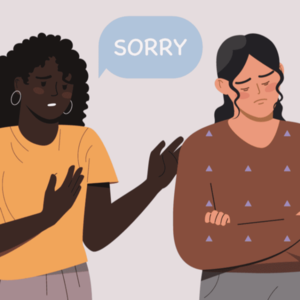How to make a good apology
Apologising is one of the first relationship skills we're taught as children. "Say sorry to your friend for stealing his toy", "Apologise to your mother for being so rude!" Children often apologise because they are told to by adults, regardless of whether they mean it, and the recipient is often told to forgive, regardless of whether they feel it. But the skill of making a heartfelt, genuine apology must grow as we become adults if we want to nurture healthy relationships.
道歉是我们从小就被教导的基本人际关系技能之一。“向朋友道歉,因为你拿了他的玩具”,“向妈妈道歉,因为你太无礼了!”孩子们通常是被大人要求道歉的,不管他们是否真心,而对方也常常被要求原谅,不管他们是否真的愿意。但如果我们想培养健康的人际关系,那么随着我们长大成人,学会真心诚意地道歉这一技能也必须有所提升。
Dr. Aaron Lazare, psychiatrist and apology expert, says a good apology should have four elements. The first is to acknowledge the offence and admit that you have wronged someone. Next, there's an opportunity to explain what happened, without excusing yourself – in fact, it's sometimes best to simply say, "There's no excuse for my behaviour."
精神病学家兼道歉专家亚伦·拉扎博士认为,一次好的道歉应该包含四个要素。首先,要承认自己得罪或伤害了他人。其次,可以解释事情的经过,但不要试图为自己开脱——实际上,有时候最好直接说:“我的行为没有借口。”
The third step is to express remorse and show that you understand how the behaviour has impacted the other person. Lastly, offer to make amends. If the mistake involved physical damage, have it repaired. If it involved emotional pain, promise to be more sensitive in the future.
第三步是表达悔意,表明你理解自己的行为对对方造成了什么影响。最后是提出弥补,如果错误造成了物质损害,就去修复它;如果造成了情感伤害,就承诺以后会更加谨慎。
Research shows that an apology is more effective when it is more costly to the apologiser, whether that's in terms of money, effort or time. For example, a study called 'Do sincere apologies need to be costly?' found people were more convinced by an apology if the apologiser had to inconvenience themself in order to deliver the apology. For example, if that person made a journey to say sorry, rather than just waiting for the next meetup.
研究表明,道歉的效果与道歉者付出的代价成正比,无论是金钱、精力还是时间。例如,一项名为“真诚的道歉需要付出代价吗?”的研究发现,如果道歉者为了道歉而让自己不便,人们会更容易被这种道歉打动。比如,如果一个人专门跑一趟去道歉,而不是等到下次见面再说,这样的道歉会更有说服力。
A 2025 study called 'Sorries seem to have the harder words', found that people use longer words when apologising than when they're not apologising. It also found that people perceived apologies with longer words as more apologetic than apologies with shorter words.
2025年的一项研究名为“道歉似乎更难开口”的研究发现,人们在道歉时使用的词汇比平时更长。此外,研究还发现,人们认为使用较长词汇的道歉比使用较短词汇的道歉更能表示歉意。
So, be sincere and own your mistakes, remembering that forgiveness can't be forced – the other person has the freedom to forgive or not to forgive. But what's better: harbouring guilt for the rest of your life, or taking that weight off your shoulders?
所以,要真诚地承认自己的错误,记住原谅是不能强求的——别人有权选择原谅你,也有权选择不原谅。但问题是:是带着愧疚度过一生,还是卸下这个沉重的负担呢?
词汇表
recipient [rɪˈsɪpiənt] 接受者,收受者
forgive [fəˈɡɪv] 原谅,宽恕
heartfelt [ˈhɑːtfelt] 衷心的,真诚的
genuine [ˈdʒenjuɪn] 真诚的,真心的
nurture [ˈnɜːtʃə(r)] 养育,培育,培养
psychiatrist [saɪˈkaɪətrɪst] 精神病医生,精神病学家
offence [əˈfens] 冒犯,得罪
wrong 不公正地对待,冤枉
excuse oneself 为自己开脱,为自己找借口
remorse [rɪˈmɔːs] 懊悔,悔恨,自责
make amends [ə'mendz] 赔偿,补偿
sensitive [ˈsensətɪv] 善解人意的,体贴的,谨慎的
costly [ˈkɒstli] 昂贵的,代价高的
apologiser [əˈpɒlədʒaɪzə(r)] 道歉的人
inconvenience [ˌɪnkənˈviːniəns] 给…造成不便,麻烦,打扰
meetup [ˈmiːtʌp] 聚会,会面
apologetic [əˌpɒləˈdʒetɪk] 愧疚的,表示歉意的
own one's mistakes 承认自己的错误
harbour [ˈhɑːbə(r)] 心怀,背负(某种感情或想法)
take the weight off one's shoulders 卸下重担,摆脱负担
📖 翻译、pdf见公众号【琐简英语】,回复"1"可进【打卡交流群】


BBC随身英语|如何真诚有效地作出道歉?
2分钟 · 1421·
1421· 0
0
 1421
1421 0
0
